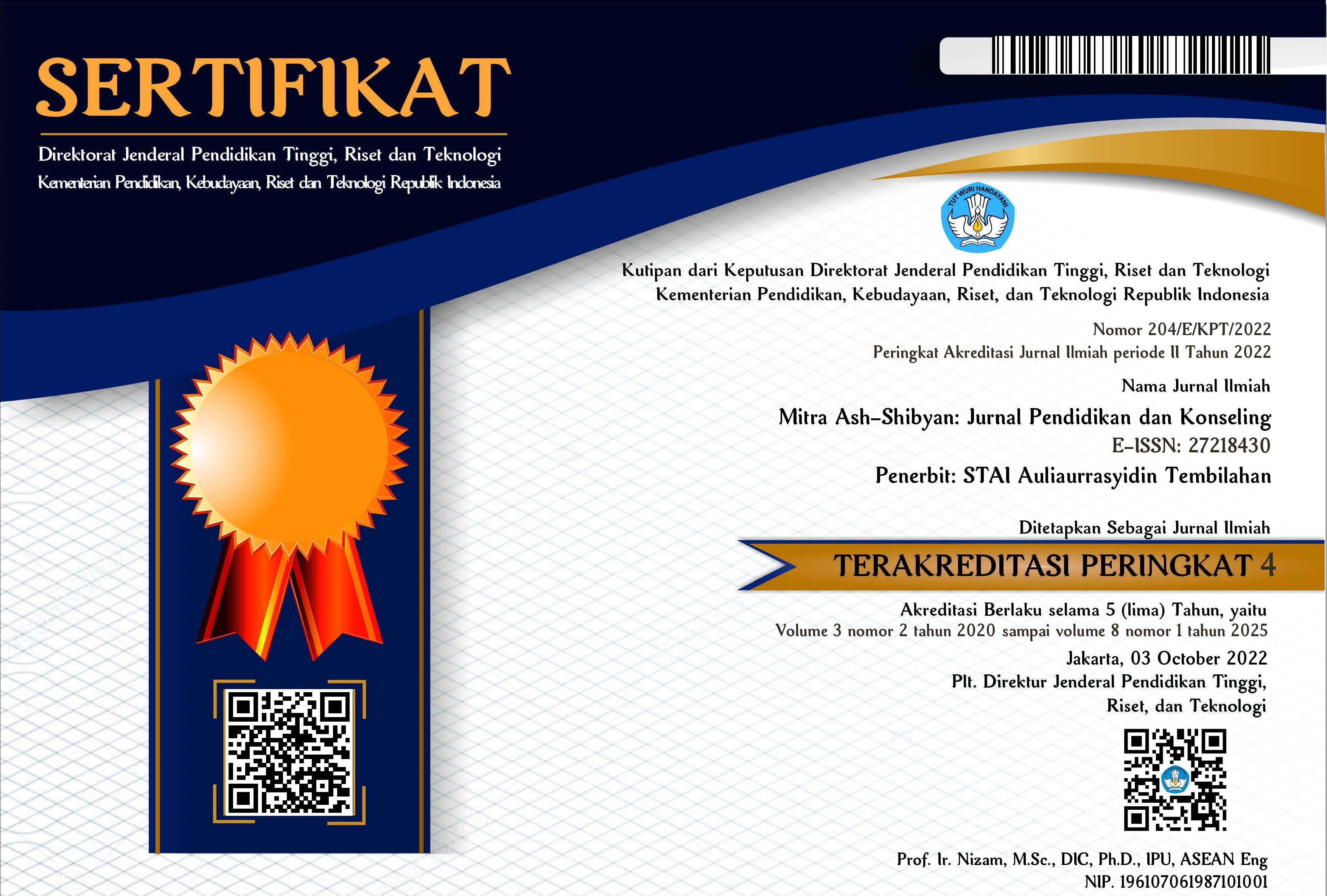Strategi Guru dalam Mengembangkan Sosial Emosional Anak Usia Dini
DOI:
https://doi.org/10.46963/mash.v7i01.1396Keywords:
Social-emotional, Teacher strategies, Kindergarten studentsAbstract
Social-emotional is one of the important aspects should be developed in children from an early age. This is because the development of social-emotional will impact much on their further development. This development can be started from children of 5-6 years old. This research aims at exploring the teacher strategies in developing social-emotional of the students. This belongs to qualitative descriptive research. The data were collected through the use of observation and interviews at Al-Mubarak Kindergarten and Islamic-Integrated Kindergarten of Ash-Shiddiq, Bone Regency. They were then processed in three stages of analysis, namely data reduction, data display, and verification or conclusion. The results reveal that teacher used various strategies in developing social-emotional of the students, including: a) rapport, positive reinforcement, and matching and mirroring in the realm of self-awareness; b) advice and appreciation in the form of positive affirmations in the realm of responsible attitudes; and c) direct direction and practical learning in the realm of prosocial behavior. These strategies can be modeled and developed again by parents and other teachers.
Downloads
References
Alfiyah, S., Fitri, N. L., & Novitasari, N. (2023). Strategi Guru dalam Menangani Siswa ADHD di TK ABA Percontohan Bojonegoro. Mitra Ash-Shibyan: Jurnal Pendidikan dan Konseling, 6(02), 115–124. https://doi.org/10.46963/mash.v6i02.927
Amini, M., & Mariyati, M. (2021). Meningkatkan Karakter Anak Usia Dini melalui Pemberian Penguatan. Jurnal Obsesi : Jurnal Pendidikan Anak Usia Dini, 5(2), 2101–2113. https://doi.org/10.31004/obsesi.v5i2.1128
Argiani, A. R., & Slameto, S. (2015). Supervisi Kunjungan Kelas untuk Meningkatkan Kompetensi Pedagogik Guru SDN Cukil 01, Tengaran, Kabupaten Semarang [Universitas Kristen Satya Wacana]. In Kelola: Jurnal Manajemen Pendidikan (Vol. 2, Issue 1). https://doi.org/10.24246/j.jk.2015.v2.i1.p1-11
Drupadi, R. (2020). Mei 2020 | Hal. 30-36. Cakrawala Dini, 11(1), 30.
Frisby, B. N., & Martin, M. M. (2010). Instructor–Student and Student–Student Rapport in the Classroom. Communication Education, 59(2), 146–164. https://doi.org/10.1080/03634520903564362
Mayangsari, D., Sari, E. D. N., & Munaila, N. (2017). Peningkatan Perilaku Pro sosial pada Anak Usia 4-5 Tahun melalui Kegiatan Outbond Fun Estafet di TK PGRI Langkap Burneh Bangkalan. Jurnal PG-PAUD Trunojoyo : Jurnal Pendidikan Dan Pembelajaran Anak Usia Dini, 4(2), 115. https://doi.org/10.21107/jpgpaud.v4i2.3574
Miles, M.B., & Huberman, A. M. (1992). Analisis Data Kualitatif (T. R. Rohidi (ed.)). Penerbit Universitas Indonesia.
Moleong, L. J. (2017). Metodologi Penelitian Kualitatif Edisi Revisi. Remaja Rosdakarya.
N, E. M., & Kurniati, E. (2022). Upaya Kendali Emosi Anak Usia 4-6 Tahun melalui Afirmasi Positif di Masa Pasca Pandemi.
Ndari, D. (2018). Metode Perkembangan Sosial Emosi Anak Usia Dini. Edu Publisher.
Permendikbud No. 137, Tahun 2014 tentang Standar Nasional PAUD.
Rakhma Ardhiani, N., & Darsinah, D. (2023). Strategi Pengembangan Perilaku Pro sosial Anak dalam Menunjang Aspek Sosial Emosional. Murhum : Jurnal Pendidikan Anak Usia Dini, 4(1), 540–550. https://doi.org/10.37985/murhum.v4i1.263
Ramadan, S., Maria M., H. E., & Usman, U. (2017). Analisis Implikatur pada Kolom Mang Usil dalam Surat Kabar Harian Kompas dan Implikasinya dalam Pembelajaran Bahasa Indonesia di SMA. RETORIKA: Jurnal Bahasa, Sastra, dan Pengajarannya, 9(1), 80-89. https://doi.org/10.26858/retorika.v9i1.3796
Rasyid, N., & Ramadan, S. (2022). Analysis of Language Errors in Student Thesis. Ekspose: Jurnal Penelitian Hukum dan Pendidikan, 21(1), 1343–1352. https://doi.org/10.30863/ekspose.v21i1.2702
Sanjaya, W. (2015). Penelitian Pendidikan. Prenada Media.
Saputri, E. (2020). Kreativitas Guru dalam Mengembangkan Sikap Sosial Anak Usia Dini Melalui Permainan Balok. UIN Sunan Kalijaga.
Sari, J. (2023). Analisis Deviant Behavior dalam Keluarga {. 8(4).
Sembiring, I. S. (2020). Differences in Rough Motoric Development, Language and Prosocial Behavior in Children Who Kindergarten Program Full Day and Regular in 2019. Excellent Midwifery Journal, 3(2), 102–114. https://doi.org/10.55541/emj.v3i2.141
Susanto, A. (2021). Pendidikan Anak Usia Dini: Konsep dan Teori. Bumi Aksara.
Tusyana, E., & Trengginas, R. (2019). Analisis Perkembangan Sosial-Emosional Tercapai Abstrak. Jurnal Iventa, 3(1), 18–26. http://jurnal.unipasby.ac.id/index.php/jurnal_inventa/article/download/1804/1626
Wahiddah, S. A. N., & Julia, J. (2022). Afirmasi positif: Booster untuk Meminimalisir Hambatan Belajar Siswa Sekolah Dasar. Jurnal Penelitian Ilmu Pendidikan, 15(2), 189–199. http://dx.doi.org/10.21831/jpipfip.v15i2.50910
Windayani, D. (2021). Teori dan Aplikasi Pendidikan Anak Usia Dini. Yayasan Penerbit Muhammad Zaini.
Yahro, S. U. (2009). Upaya Guru dalam Mengembangkan Sosial Emosional Anak Usia Dini dengan Pendekatan Beyond Centers and Circle Times. UIN Sunan Kalijaga.
Yuliana, Y., & Hukmah, A. (2019). Strategi Komunikasi Dalam Penguatan Afirmasi Positif untuk Membangkitkan Kesadaran Anak-anak di Sikola Mangkasara. Jurnal Komunikasi dan Organisasi (J-KO), 1(1), 92–101. https://journal.unismuh.ac.id/index.php/jko/article/view/5246
Downloads
Published
Issue
Section
License
Copyright (c) 2024 Syahru Ramadan

This work is licensed under a Creative Commons Attribution-ShareAlike 4.0 International License.
Authors who publish with this journal agree to the following terms:
1. Copyright on any article is retained by the author(s).
2. The author grants the journal, right of first publication with the work simultaneously licensed under a Creative Commons Attribution shareAlike 4.0 International License that allows others to share the work with an acknowledgment of the work’s authorship and initial publication in this journal.
3. Authors are able to enter into separate, additional contractual arrangements for the non-exclusive distribution of the journal’s published version of the work (e.g., post it to an institutional repository or publish it in a book), with an acknowledgment of its initial publication in this journal.
4. Authors are permitted and encouraged to post their work online (e.g., in institutional repositories or on their website) prior to and during the submission process, as it can lead to productive exchanges, as well as earlier and greater citation of published work.
5. The article and any associated published material is distributed under the Creative Commons Attribution-ShareAlike 4.0 International License







2.png)



